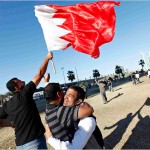What Does Bahrain's Turmoil Mean for Iran?
 The West's response to the protests in Bahrain should be guided by one test: Will our decisions bring us closer to - or further from - democracy in Iran?
The West's response to the protests in Bahrain should be guided by one test: Will our decisions bring us closer to - or further from - democracy in Iran?
Bahrain is an island nation in the Persian Gulf, connected by a causeway to Saudi Arabia.
Bahrain has been swept by protests against the ruling family -- protests that have been met by lethal repression.
Bahrain looks a modern, prosperous country. Relatively poor in energy resources, Bahrain has diversified into refining, services, banking. Yet oil still provides 60% of the state budget: A revenue source that has enriched the Sunni ruling class, even as the country's Shiite majority struggles with chronic underemployment.
Bahrain also happens to be the base of the U.S. Fifth Fleet.
The obvious thing to worry about in Bahrain is that the current unrest could invite meddling by fellow Shiites across the Gulf in Iran. (And in fact Iran has meddled in Bahrain since the days of the shah.)
But let's try some thoughts that are less obvious.
- People should be careful about assuming that Arab speaking Shiites will cheerfully submit to domination by Persian-speaking Shiites. Especially when the particular Arab-speaking Shiites live in a country that is freer, richer and generally more fun than Persia.
Bahrain is a rich place, GDP per capita of over $28,000 according to the World Bank. That figure puts Bahrain in the same neighborhood as Israel. Bahrain is seven times richer than Iran.
Bahrain educates its women: women are almost exactly as likely as men to finish high school, according to the UN Human Development Index. (In Iran, women are only about two-thirds as likely as men to finish high school.)
- By the numbers, Bahrain meets more of the preconditions for democracy.
Bahrain is 12 times richer than Egypt. One in seven Egyptians cannot read. In Bahrain literacy is virtually universal. According to the Pew survey of Muslim belief, 84% of Egyptians believe that apostates from Islam should be killed, 82% believe that adulterous women should be stoned to death, and 77% believe that thieves should have their hands cut off. The only other major Muslim country to report anything like such fundamentalist attitudes is Pakistan.
In Bahrain, women vote and drive. Hijab is not required. Alcohol may be legally sold. Bahrain's ambassador to the United States is a Jewish woman who previously served in the country's elected legislature and headed the local branch of Human Rights Watch. OK, that last part is probably just a stunt. Still--an interesting stunt.
- Bahrain's royal form of government opens the way to compromise: more representation and power to the elected legislature, while reserving national security issues to the hereditary executive. You might call this the "French" constitutional model. Such a model could help resolve a lot of concerns in Egypt too, where the Muslim Brotherhood could conceivably win the largest block of seats in a freely elected Parliament -- but likely lacks the clout to defeat an incumbent president backed by the Egyptian military.
- Precisely because Bahrain is so closely tied to the West, the West cannot keep quiet about violent repression in Bahrain. This is not Egypt: An ally, but ultimately a country at an arm's-length relationship to the western world. An entire American carrier battle group is based in Bahrain -- there is no way the United States can avoid being implicated in the actions of the Bahraini government.
And given that the West is pressing so hard for democracy in the Shiite-majority country across the water, indifference in Bahrain invites damaging accusations of opportunism and hypocrisy.
Always and ever: Iran is the big play in the Middle East. A democratic Iran may not be an entirely congenial presence. Persia was once a great world empire, and many Iranians might well vote for nationalist politicians in a free election. But a more democratic Iran would be a less dangerous place for everyone, including its own people, than today's theocratic, terrorism-supporting Iran. Every regional decision has to be measured against the test: Is this moving us closer to -- or further from -- a positive change in the Iranian political system?
That test should guide decisions about Bahrain, and about a lot more than Bahrain.
Originally published in the National Post.